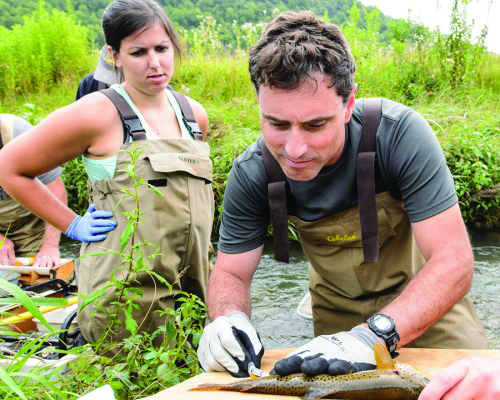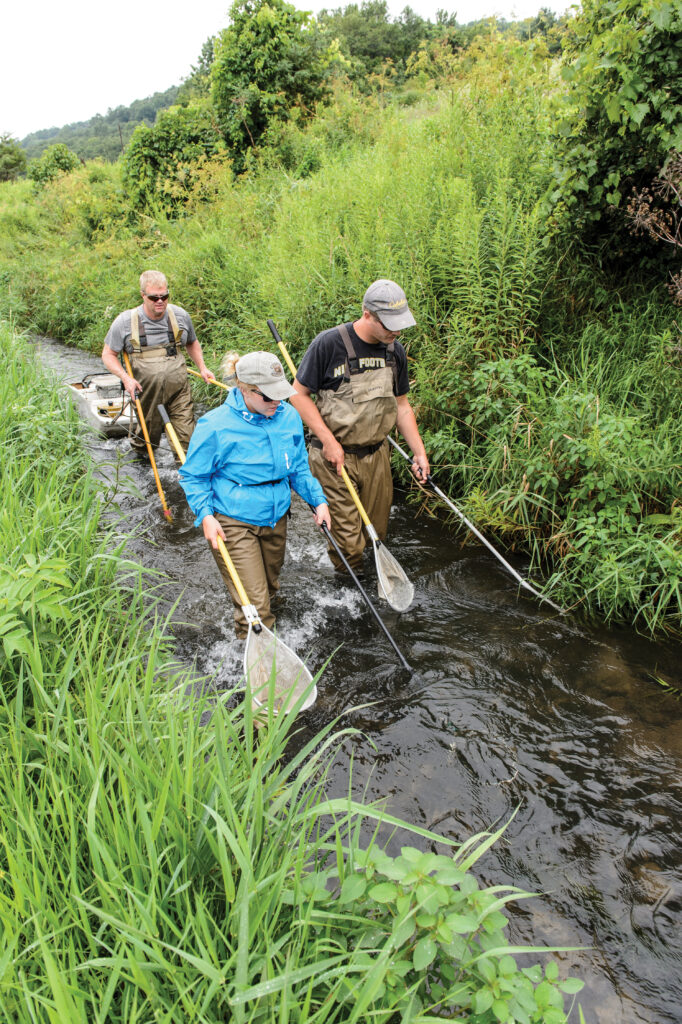Wisconsin sport fish carry suite of new viruses
Discovery is part of first-ever study of viruses in healthy fish across the state.
Researchers at the University of Wisconsin-Madison have detected a suite of new viruses in five species of Wisconsin sport fish. Although none pose a threat to human health, one is a type of coronavirus usually associated with birds. It was found in healthy walleyes from Wisconsin lakes. The finding is part of a Wisconsin Sea Grant-funded study of the natural diversity of viruses (or virome) of fish in Wisconsin and is the first project of its kind in North America.

Tony Goldberg takes a blood sample in a non-lethal way from trout caught near Wauzeka, Wisconsin, while Whitney Theil observes. The fish was collected by DNR staff members to test for emerging diseases in the fish population. Image credit: Bryce Richter, UW-Madison
Tony Goldberg, a professor in the Department of Pathobiological Sciences, said his research group identified 19 viruses in blood samples from 103 Wisconsin bluegills, brown trout, lake sturgeon, northern pike and walleye. Seventeen of the 19 viruses were new to science. Among them was the first fish-associated coronavirus from the Gammacrononavirus genus, which differs from the type of virus that causes COVID. It was present in 11 out of 15 walleyes sampled by the Wisconsin Department of Natural Resources (DNR).
While the findings are novel, Goldberg stressed that anglers should not be worried. “None of these viruses can infect people. It’s not a risk for people to catch, handle and eat fish because of these viruses. There’s no evidence that these viruses are causing any problems. They may just be part of the natural ecosystem of these fish,” he said.
The results were recently published in the journal “Pathogens.” Of the different species of fish sampled, lake sturgeon blood contained the most viruses (97% of samples), with brown trout samples showing the least prevalence (6%).
Regarding the coronavirus found in walleye, Goldberg said, “There’s an important poultry disease called infectious bronchitis that is caused by a relative of this new virus, but this is the first example in fish and it is an honest-to-goodness coronavirus.”
This virus survey builds on previous Sea Grant-funded research in which Goldberg studied viral hemorrhagic septicemia in fish. The DNR took blood samples from healthy fish across Wisconsin to test for viral hemorrhagic septicemia antibodies. They saved the blood and used it for this current study on the viromes of Wisconsin fish.
The findings will aid fishery managers when they routinely test the health of fish about to be released into state lakes from hatcheries or for fish that are being shipped out of state.

Wisconsin Department of Natural Resources fisheries technicians collect trout from a creek near Viroqua, Wisconsin. Image credit: Bryce Richter, UW-Madison
“This is a huge problem for fisheries managers that happens all the time,” Goldberg said. “We recently had a case where there were thousands of muskies that were ready to be released and they came back with an unknown virus. So, do you release them? Do you just keep them there? Do you kill them all? Maybe there are viruses out there that are a normal part of the ecosystem and they just infect a lot of fish, but they don’t cause disease.” This study’s findings will help managers decide what is normal and what is concerning in terms of fish viruses.
Goldberg said that one thing anglers can do to ensure fish viruses aren’t spread is not to transport fish between water bodies “If you move a fish from one water body to another, you’re moving everything that lives on and in that fish, and potentially causing problems,” he said.
As a follow-up, Goldberg’s collaborators at the U.S. Fish and Wildlife Service have designed specific tests for the various viruses and the team will test a larger set of fish blood samples from around Wisconsin. They will map the viruses so that fisheries managers can tell what’s normal for a particular watershed and whether stocking can or should not proceed.
He also plans to develop a “Fish Get Sick, Too,” educational program. Goldberg said that fish are “animals, like anything else, and they get sick, too. I think if people were more aware of that, it might help reinforce some of the best-handling practices we do for catch-and-release fishing, some of the harvest practices, and food safety things we do.”
Other members of the research team include Charlotte Ford and Christopher Dunn with the UW-Madison Department of Pathobiological Sciences; and Eric Leis and Isaac Standish with the U.S. Fish and Wildlife Service, La Crosse Fish Health Center.
The post Wisconsin sport fish carry suite of new viruses first appeared on Wisconsin Sea Grant.News Releases | Wisconsin Sea Grant
News Releases | Wisconsin Sea Grant
https://www.seagrant.wisc.edu/news/wisconsin-sport-fish-carry-suite-of-new-viruses/







